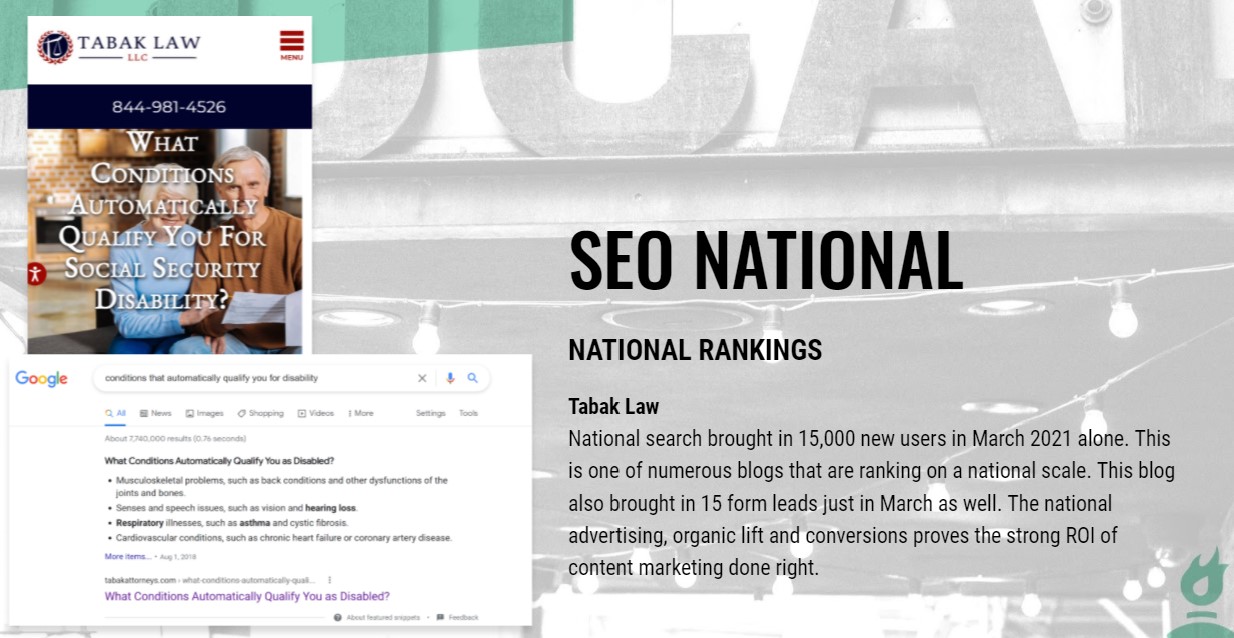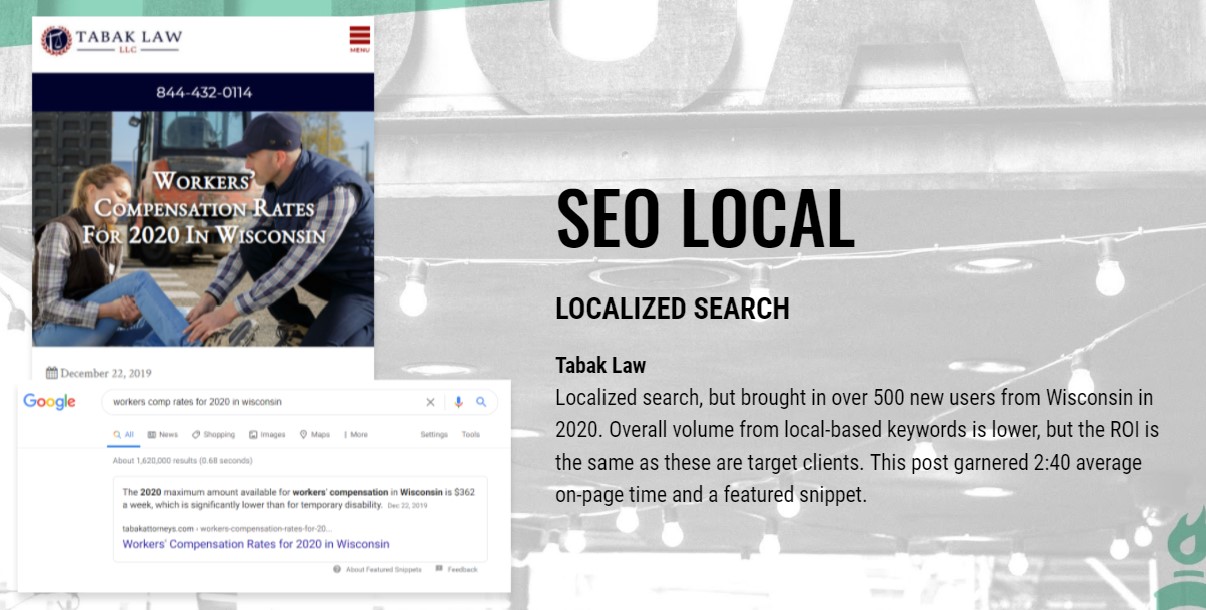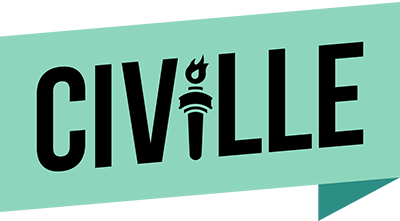
Most law firms know what SEO is. Many firms even invest in some form of SEO. But only a select few make a meaningful investment in SEO that provides ROI for the firm.
It’s easy to see how this happens. Attorneys understand the need to optimize their site and be found in search. But there is an abundance of agencies charging a premium for often hit-or-miss services that don’t move the needle. The result is many law firms invest in SEO that isn’t providing value, or worse, give up on SEO due to a bad experience or confusion about the value.
It can be frustrating, but if you do SEO right, your law firm can reap the benefits. First-party leads from your website are often your best leads. And while paid search is popular and has its place in your marketing mix, organic search done right provides the best ROI, as a high-ranking page that you already paid for will continue to bring in traffic and leads.
78% of Law Firms Say First-Party Leads Convert Better than Other Sources
Organic Traffic Has a 2% Higher Conversion Rate for Law Firms than Paid Search
Organic Search Generates 65% of Call Conversions in Legal
To better understand the best way to do SEO for law firms, it’s best to split it into two categories:
- Initial SEO during site build (or rebuild)
- Ongoing SEO for your site
Keep in mind, if your site wasn’t built properly for SEO initially, it can probably still be saved by implementing some fixes and the right ongoing tactics. But it is possible that a full or partial rebuild will be needed to get the site fully optimized.
Law Firm SEO During Site Build
If you sign up for a new provider to do your site build, you must make sure they understand all the components in this section. If they don’t, your new site will not live up to your expectations for performance.
Technical SEO
When building a site, a web provider needs to have a handle on technical SEO. This includes a multitude of items, including the platform the site is built on and other on-page elements. Here are some of the main components.
- Custom-Written Interior Content – Each page on the site should be custom-written with rich copy relevant to the law firm, their unique business propositions and what they can provide. This includes the home page, practice pages, attorney pages, about us pages, and more. The importance of making the site personable through custom content can’t be overstated.
- Title Tags – Optimizing each Title Tag uniquely for the business and geos that the firm represents is an essential factor.
- Meta Information – Writing unique meta descriptions gives each page more relevance with the search engines and gives you the ability to manipulate what is displayed in search. Meta tags and descriptors are essential throughout the site.
- H Tags – While the natural copy is the most critical SEO element to a page, having the proper H Tags helps Google and the other search engines understand the hierarchy of the page (and site), with the H1 essentially being the main headline. Sub-heads will have H2s, and so on.
- Optimized URLs – Having clean URLs without parameters is a great way to help each page show up in search and provide a clean user experience on the site.
- ALT Tags – An ALT tag on each image on the site is not only essential for SEO, but not having them can be an accessibility issue. See the Dominoes example for proof of the importance of accessibility.
- Schema Markup – Having law firm schema markup on your pages will put you ahead of the game and help Google and the search engines understand and index your site pages.
- Secure Site – An SSL certificate is essential now, as data security continues to be an emerging topic online. Aside from the obvious security concerns, it’s also a positive ranking factor to be SSL-enabled.
- Sitemap Submitted – Ensuring that your site has a sitemap and that it’s been submitted to Google Search Console will help with indexing and help Google read your site as its intended, avoiding any indexation or technical errors.
Website Design
The design of your website from an aesthetic and user experience perspective can be just as important for SEO as the technical aspects. There’s great importance on the actual branding of your firm and site, but ensuring that everything is placed correctly to allow clients to navigate where they want to go – and ultimately convert – is key.
Here are the main site design components that relate to SEO:
- Fonts and Images – Using clear fonts that allow potential clients ease of navigation is a positive SEO component. Clear images that relate to the content – and that are compressed – will help the site perform as well. Differentiating your images and giving each one unique ALT text that relates to the image is also important for SEO.
- Site Content Layout – We covered the importance of unique content above. But how it is laid out is essential. Google not only can crawl the content, but the algorithm is capable of essentially seeing the content as a person can. Creating clear sections and making the content digestible to a user is an essential SEO ranking factor.
- Menus and Linking – Creating easy-to-navigate menus and linking appropriately throughout the site helps guide the user cleanly through your site. That user experience is detectable by Google, and actual user data is collected to reward your site. In other words, if you are making natural connections for users and they are behaving as expected, your site will rank better.
Website Page Speed
The speed at which each page within a website loads has never been more critical for SEO considerations. Google has announced that page speed is a ranking factor, which has only gotten more important in recent months. Where many law firms fail here is on mobile page speed. Approximately 70% of legal website traffic is mobile, so optimizing for mobile page speed is essential. Here are some of the main items below.
- Test your Site – First, you need to determine your site’s page speed to see where you are currently sitting. This may help explain some of your troubles with ranking and conversions. Google PageSpeed Insights is the best current tool to check this.
- Optimized Images – Having compressed images and video while keeping resolution high is going to go a long way to improving your page speed. This is also one of the easier fixes for your site, as it doesn’t require a complex deployment to fix.
- Minimized CSS – This gets technical, but basically, you need to ensure that the critical elements are displaying right away, and the rest are loading appropriately after. Lazy-loading is a piece of this as well, in addition to load order.
- Website Hosting – It’s possible the current hosting isn’t conducive to an optimized site. An excellent hosting platform provides performance optimization, a Content Delivery Network (CDN), and more to assist with SEO optimization.
Check Out Our Full Guide to Page Speed Optimization for Law Firms
Ongoing Law Firm SEO
Initially optimizing your site for SEO is just the beginning. To gain and maintain search visibility, you need to monitor, adjust, add, and optimize regularly.
But this is where it gets tricky. There are a lot of agencies that provide SEO without much meat behind it. Making sure deliverables are being provided and worthwhile actions taking place on a daily, weekly, monthly basis will help ensure that you are getting the bang for your buck.
Regular Monitoring and Updates
SEO is always changing. And once a site is launched, it will sit with its current configuration without human involvement. Having a process for monitoring and updating the site when new practices emerge or something breaks is essential to keeping your site healthy and ranking.
- Weekly Site Audit – Having your site connected to a service or going through a technical inspection every week avoids any SEO errors from arising. Every site will have elements that slip as it ages – from links breaking to new pages not having meta or ALT text, or a slew of other possibilities. No matter what the issue, a regular audit allows the fixes to occur right away before any serious issues arise.
- Google Search Console Monitoring – Google Search Console is one of the best tools you can have to monitor site health – and it’s free. Here, you can submit sitemaps, monitor 404s, monitor search performance, monitor errors and any core web vitals related to SEO.
- Google Analytics Monitoring – Checking for any traffic anomalies is easy with regular auditing of Google Analytics (GA). If a bot hit your site or conversions stopped tracking, you will know right away by regularly logging in and checking Google Analytics. Linking GA with Google Data Studio also allows you to create custom dashboards that can be used to monitor these items. You can also set up custom 404 alerts and other automation through GA.
- Visual QA – No matter how many tools and alerts you have set, a visual QA of the site should still be conducted at least weekly. A design element may have fallen out of place that affects overall UX – but it’s not something a tool would have zeroed in on in a timely manner.

Content Development
There’s no better way to get in the good graces of Google than developing custom content regularly on your website. But that doesn’t mean creating simple content to check the box. Providing in-depth content that makes sense for your business and the area you serve and that will help a potential client with a need is what can set you apart. Remember, every piece of content that is created should be researched and provide real value for a user – this isn’t simply a keyword optimization game. Create content for the user.
- Unique Content for Every Page – This was mentioned above, but every page on your website should have uniquely written content and be valuable to a user. For example, your service area details pages should talk about what you do, your experience, what someone can expect from you, a Q&A section, and common incidents of these particular cases. By creating in-depth pages for each service area, you are helping the potential customer understand their options while making the case why they should work with you.
- Custom Blog Content – Adding a blog to your website is a great way to expand on your business’s specific elements and tell its story. As mentioned above, your practice area details pages should be thorough. But, you don’t want them getting too far into the weeds on something very specific that is relevant only to a few users. This is where your blog comes into play. Expound on a specific area of law that may not have a lot of results currently, and you can find your site ranking for a keyword that is commonly typed in search. Conversely, you can also use the blog to talk about your community involvement, awards won, and much more. Updating your blog is a great way to take advantage of keyword opportunities and tie yourself to the community.
- Create Custom Pages – In addition to the blog, you can create custom landing pages for specific elements of the business you want to focus on. These can also be created for use with PPC campaigns. For example, you may have a detailed personal injury page, but you may focus on car accidents in particular with PPC campaigns. While it’s okay to have a page for car accidents on your site, you may want your PPC landing page to be more direct to gather a lead from someone that needs help now. A custom page optimized for lead generation would be perfect.
- Keyword Research – None of the above happens without thorough keyword research. This applies to the site build and for ongoing content. If you are doing keyword research correctly, you will be able to isolate the terms that you should be optimizing your site, blog entries, and landing pages for. This includes national and local keyword research, depending on your business’s primary market and what you are writing about. You will even stumble across long-tail keywords that have high opportunity, as no one has written something on that topic before.
- Rank Monitoring – In addition to researching what keywords to target and go after, you will want to ensure that your current keywords continue to maintain their positions. Just like your strategy, it’s quite possible that your competitors are trying to take your positions away as well. If you can isolate who and when, you can continue to optimize your own pages, create supporting content, generate links, and more to make sure they don’t take your top positioning away.
Civille Content Marketing Case Study


Off-Site SEO
In addition to everything you can do on your site to optimize your SEO and build rankings, there are off-site measures that need to be taken as well. This is how you round out your SEO strategy by ensuring that your brand is represented to its full extent everywhere.
- Google My Business – Setting up, optimizing and updating your Google My Business (GMB) listing is one of the most important things you can do to bring in more business. Your GMB listing essentially functions as a mini-website, where visitors searching for your brand or keywords associated with your practice areas will land on the GMB page if it exists and if it is optimized. The exposure here is currently unmatched from any other off-site source.
Check Out Our Guide on How to Optimize Your Law Firm GMB Page
- Business Listings – Ensuring that your law firm site listings are accurate and that they exist will help with your off-site SEO. For anyone looking for a law firm in their area, these sites still do have relevance and bring in referral traffic.
- Review Response – Much of this happens on your GMB listing, but there are many other review sites, including Facebook. It’s important to have access to and respond to reviews on the free sites that allow you to do so. Google has even admitted that businesses that respond to reviews on GMB will be rewarded with higher rankings in the local pack. Overall, responding as a business – good or bad – shows that you are engaged with your clients, which is a good look.
- Link Building – Having authoritative sites link to your site is still one of the tried and true methods to boosting your search rankings. Creating engaging content alone can help with this, as sites like to link to other sites that tell the best story on a topic. But there are other strategies, such as guest posting, local spotlights, comment, and review monitoring, that can work for you – among others.
Reporting On SEO Performance
Having clear deliverables and work that is being done regularly from an SEO agency (or yourself) is essential for your law firm. But they should also be reporting on your site’s performance. If they can’t speak to the work they are doing and how it impacts your business, you shouldn’t be working with them.
While organic traffic growth is the most obvious performance benchmark with SEO, you should also be apprised to what kind of audit items are appearing and how they are being addressed. With content development, understand what is being posted and how often, and how that effort is affecting ranking keywords and overall search visibility of the site.
Not all organic traffic is easy to track to lead acquisition, but clear performance metrics can show if it’s working. And if set up correctly with tracking, you will be able to account for a bulk of leads that were obtained through organic traffic.
If you need help understanding how your current site is performing, if your SEO provider is doing their job, or would like to learn more about the Civille platform and products, don’t hesitate to give us a shout. We are happy to provide consultations with no obligation.





